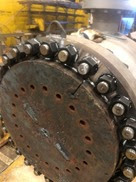Electric Assembly Tools is preparing the Indian automotive industry to be future-ready
How Electric Assembly Tools is preparing the Indian automotive industry to be future-ready!
The economy of the automotive industry is dramatically changing rapidly. The continuous development in the market, rising new technologies, changing consumers' preferences, and sustainability policies triggered the market value. Digitization has changed every industry, and so has the automotive industry! As per the recent market survey, the Indian automotive industry contributes 49% of manufacturing GDP, 7% to the nation's GDP, and employs over 37 million people.
So, over time, the automotive industry is rising towards a new world in accelerating electric vehicles and new business models. The automotive industry is changing itself in terms of the challenges arising from pandemics, industrial 4.0 implementations, and safety norms. There is a fast-emerging transformation in the EV ecosystem, and this is how the chances of receiving opportunities in the automotive industry are increasing.
The current dynamic environment requires different approaches for growth. Even now, the companies are increasingly dedicated to transforming their procedure of manufacturing, production, and assembling of supporting functions. The companies are now targeting more Electric Assembly Tools ,and DC Tools to synchronize industry 4.0 screwing technology. The role of these electric assembly tools is wider, ranging from growth imperatives, navigating complex manufacturing, adopting industry 4.0, & leveraging smarter assembly automated systems.
How setting up the electric assembly tools plays a strong role?
Yes, electric assembly tools are laying the groundwork for development of the Indian automotive industry for the future. Setting up an electric assembly tool has the most impact in the automated assembly streamlining process. Apart from that, selecting the ideal tools is also a tough task, and companies need to be aware of all the innovative manufacturing techniques in the market.
For workshop tooling of automotive manufacturing, a business needs to adopt industry 4.0 compatible systems. To do this process in the right way, the industry requires only two requirements: the quality manufacturer and the list of tools required based on product requirements.
We are looking forward to innovating and developing solutions in order to achieve the changing customer demands and market opportunities. No matter what the industry is, innovation plays a great role; let's take the overview on setting up the mechanism of automotive manufacturing to determine the right tool! Many varieties of automotive manufacturing need varieties of torque, and here are some examples.
Light Assembly: The precise and small electric assembly tools and applications come under this range. These are essential for assembling electronics that have automotive features and fastening up the delicate parts of plastic. Light assembly measured the varieties of delicate torque ranges of the automotive industry in oz and lbf. These torque ranges should be applied precisely through the electric tools but ensure that the tools check the electrostatic discharge.
Medium-sized Assembly: Applications for the medium-sized automotive assembly include pedal and valve cover bolt installation. These torque applications range about ~75 lbf, and ft is accomplished by the powerful assembly tools.
Bulky Assembly: The massive assembly for the components ranges about ~330 lbf. Ft. This range of torque is able to handle the handling chassis, door and frame components, axle and hub bolts, and transmission mounts.
Many factors determine the number of production stations an industry can maintain, including the factory area, labor costs, and expenses of parts, assembly flow, and the demand for the product.
Key points that every industry follows:
Indian Auto Industry: India's automotive industry is adapting to the evolving landscape in manufacturing, production, and assembly of EV Manufacturing & Petrol/ Diesel.
The industry 4.0 roadmap: The industry follows the 4.0 roadmap to achieve the benefits that include Traceability, Data integration, easy-to-use setup, and many more. This roadmap allows the industries and businesses to get more in minimal time with better productivity and minimum errors or defects.
- Pillars of industry 4.0: The industry pillars depend upon the Innovations in the industry. An agile assembly line is promoted so that each product can be tracked during assembly time and enables a faster assembly cycle.
ABS Group is an industrial equipment manufacturing and installing company that has offers highly advanced electric assembly tools and hydraulic jacks over the decades. The company received fame in the industry in a minimum time across India and the Middle East.
Apart from these, they deliver a range of industrial tools to fulfill people's demands. They trained their employees to deliver up-to-the-mark services to their clients. The tools provided by the company include both hand tools and machine-powered tools. To win the trust of their clients, they serve tools that are convenient to use and affordable in price. The company is continuously making advanced changes by improving its productivity and efficiency to make the Indian automotive industry future-ready.
Content Sources :- ABSGroup







Comments
Post a Comment